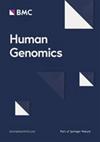The effect of family structure on the still-missing heritability and genomic prediction accuracy of type 2 diabetes
IF 3.8
3区 医学
Q2 GENETICS & HEREDITY
引用次数: 0
Abstract
This study aims to assess the effect of familial structures on the still-missing heritability estimate and prediction accuracy of Type 2 Diabetes (T2D) using pedigree estimated risk values (ERV) and genomic ERV. We used 11,818 individuals (T2D cases: 2,210) with genotype (649,932 SNPs) and pedigree information from the ongoing periodic cohort study of the Iranian population project. We considered three different familial structure scenarios, including (i) all families, (ii) all families with ≥ 1 generation, and (iii) families with ≥ 1 generation in which both case and control individuals are presented. Comprehensive simulation strategies were implemented to quantify the difference between estimates of $$\:{\text{h}}^{2}$$ and $$\:{\text{h}}_{\text{S}\text{N}\text{P}}^{2}$$ . A proportion of still-missing heritability in T2D could be explained by overestimation of pedigree-based heritability due to the presence of families with individuals having only one of the two disease statuses. Our research findings underscore the significance of including families with only case/control individuals in cohort studies. The presence of such family structures (as observed in scenarios i and ii) contributes to a more accurate estimation of disease heritability, addressing the underestimation that was previously overlooked in prior research. However, when predicting disease risk, the absence of these families (as seen in scenario iii) can yield the highest prediction accuracy and the strongest correlation with Polygenic Risk Scores. Our findings represent the first evidence of the important contribution of familial structure for heritability estimations and genomic prediction studies in T2D.家庭结构对 2 型糖尿病遗传率和基因组预测准确性的影响
本研究旨在利用血统估计风险值 (ERV) 和基因组 ERV 评估家族结构对尚缺的遗传率估计和 2 型糖尿病(T2D)预测准确性的影响。我们使用了伊朗人口项目定期队列研究中的 11,818 个个体(T2D 病例:2,210 个)的基因型(649,932 个 SNPs)和血统信息。我们考虑了三种不同的家族结构情况,包括:(i) 所有家族;(ii) ≥ 1 代的所有家族;(iii) ≥ 1 代的家族,其中病例和对照个体均有出现。采用综合模拟策略来量化 $$\:{\text{h}}^{2}$ 和 $$\:{\text{h}}_{text{S}\text{N}\text{P}}^{2}$ 估计值之间的差异。T2D中仍有一部分缺失的遗传率可以解释为,由于存在个体仅患有两种疾病中的一种的家族,基于血统的遗传率被高估了。我们的研究结果强调了在队列研究中纳入仅有病例/对照个体的家庭的重要性。这种家庭结构的存在(如在情况 i 和 ii 中观察到的那样)有助于更准确地估计疾病遗传率,解决以往研究中忽视的低估问题。然而,在预测疾病风险时,如果不存在这些家族结构(如情况 iii 所示),则预测准确性最高,与多基因风险评分的相关性也最强。我们的研究结果首次证明了家族结构对 T2D 遗传率估计和基因组预测研究的重要贡献。
本文章由计算机程序翻译,如有差异,请以英文原文为准。
求助全文
约1分钟内获得全文
求助全文
来源期刊

Human Genomics
GENETICS & HEREDITY-
CiteScore
6.00
自引率
2.20%
发文量
55
审稿时长
11 weeks
期刊介绍:
Human Genomics is a peer-reviewed, open access, online journal that focuses on the application of genomic analysis in all aspects of human health and disease, as well as genomic analysis of drug efficacy and safety, and comparative genomics.
Topics covered by the journal include, but are not limited to: pharmacogenomics, genome-wide association studies, genome-wide sequencing, exome sequencing, next-generation deep-sequencing, functional genomics, epigenomics, translational genomics, expression profiling, proteomics, bioinformatics, animal models, statistical genetics, genetic epidemiology, human population genetics and comparative genomics.
 求助内容:
求助内容: 应助结果提醒方式:
应助结果提醒方式:


